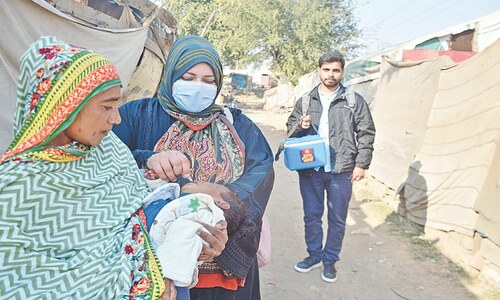ISLAMABAD, Feb 16: Rivals ended campaigning at midnight on Saturday amid more bloodbath before Monday’s general elections that can change Pakistans political course.
Leaders of all major political parties had a hectic final day of a prolonged but lacklustre and blood-stained campaign, with last-minute appeals for votes.
Hours before the stipulated end of all campaigning, a car bomb outside a pro-PPP independent candidate’s election office at Parachinar town of the party-less northwestern tribal area killed more than 30 people and wounded more than 50 while more incidents of gun and bomb attacks were reported from elsewhere.
Government sources have warned of more would-be suicide bombers on the prowl across the country to disrupt the electoral process while some 81,000 troops will be deployed outside nearly 9,000 “most sensitive” polling stations.
Leaders of the two main opposition parties – PPP co-chairman Asif Ali Zardari and Pakistan Muslim League-Nawaz (PML-N) – took time off their busy campaign engagements to meet in Lahore, possibly to plot their immediate and future response to what they see as a planned vote-rigging to block their parties from capturing power as happened in the 2002 elections and help the till recently ruling Pakistan Muslim League (PML-Q) of the regime’s loyalists. The government denies by the charges and says the elections will be free, fair and transparent.
The play of the recording of Ms Bhutto’s last campaign speech at Rawalpindis Liaquat Bagh before being killed in a gun-and-bomb attack was the main attraction at PPP campaign camps while Zardari addressed his last campaign rally at Punjabs Lalamusa town on Friday.
All the three main parties – PPP, PML-N and PML-Q – had scheduled last-minute rallies in Rawalpindi, including a telephone speech from Lahore by Nawaz Sharif.
The campaign had started with the announcement of the election schedule by the Election Commission on Nov 20 when polling for the National Assembly and four provincial assemblies by 82 million voters from a population of 160 million was set for Jan 8.But the vote was postponed to Feb 18 because of violent protests after the Dec 27 assassination of Benazir Bhutto in a gun-and-bomb attack outside Rawalpindis Liaquat Bagh park immediately after she had addressed a campaign rally there.
Originally, 272 general seats of the 342-seat National Assembly and 577 general seats of the four provincial assemblies – 297 of the 371-seat Punjab Assembly, 130 of the 168-seat Sindh Assembly, 99 of the 124-seat NWFP Assembly and 51 of the 65-seat Balochistan Assembly – were up for grabs, the remaining seats being reserved for women and minority communities to be awarded to political parties in proportion to their directly elected general seats in the National Assembly and respective provincial assemblies.
But polling has been put off for three National Assembly seats – in Ms Bhutto NA-207 Larkana-Shikarpur constituency and one in Lahore (NA-19) due to the death of a candidate, and one in North Waziristan due to law and order situation – and seven provincial assembly seats for similar reasons.
This leaves 269 general seats of the National Assembly and 570 general seats of the provincial assemblies which will be decided on Monday.
Sixty seats are reserved for women and 10 for non-Muslims in the National Assembly, 66 for women and eight for non-Muslims in the Punjab Assembly, 29 for women and nine for non-Muslims in the Sindh Assembly, 22 for women and three for non-Muslims in the NWFP Assembly, and 11 for women and three for non-Muslims in the Balochistan Assembly.
The Election Commission has appointed 125 district returning officers, mostly District and Sessions Judges, 484 returning officers, also mostly from the judiciary, and 1,027 assistant returning officers to conduct the elections.
A total of 430,000 transparent ballot boxes with plastic seals and 300,000 portable voting screens have been imported and supplied to field offices for use during the elections in collaboration with the UNDP and USAID.
Special arrangements have been made for international election observers, in collaboration with the Ministry of Interior and Ministry of Foreign Affairs, to enable them to observe the proceedings of the upcoming general elections.
According to the Election Commission, a total of 64,176 polling stations with 170,174 polling booths have been established all over the country. For the purpose, 572,000 polling personnel have been appointed by the concerned returning officers.













































Dear visitor, the comments section is undergoing an overhaul and will return soon.